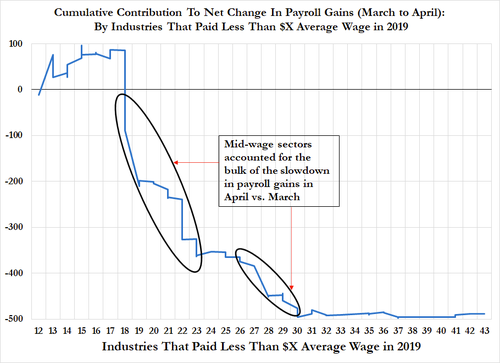Is $300 a week in UI making people lazy and does it prove UBI doesn’t work?

Claiming “lazy workers” may be nonsense, but it’s also instructive in better understanding the benefits of Universal Basic Income.
The Climate of the Labor Market is Not to Blame.
Thanks to social media, I think we’ve all seen by now the images of signs on storefronts posted by employers unable to find employees. As a result, a story of “lazy workers” has been propagated, with the blame pinned on lack of motivation to work thanks to the $300 a week unemployment insurance (UI) boost combined with three different stimulus checks that have altogether apparently fattened bank accounts to the point people just don’t want to work anymore, and thus the idea of universal basic income has been proven to be a non-starter.
All of the above is nonsense of course, but it’s nonsense that’s actually really instructive in better understanding how UBI works, and why it’s such an improvement to the existing way we do things. So in this blog post, I want to dive into this particular discussion and hopefully readers will come out the other side of this with a deeper understanding of UBI’s importance.
First and foremost, this is anecdotal data we’re talking about. A photo of a sign is not macroeconomic data, and the data just doesn’t support the story being pushed. If the UI boost were responsible for people not accepting employment, we would expect those most likely to turn down employment to be the ones with the lowest wages, but that’s not what we’re seeing. Low-wage sectors saw a much bigger labor force participation increase than higher-wage sectors paying $18 to $32 an hour. Additionally, the increases are among men, not women. Together this points away from the UI boost and toward closed schools and lack of childcare affordability as being the real reasons certain employers aren’t able to find employees. The employees they want are doing unpaid work at home that they can’t or don’t want to stop doing. People aren’t lazy. They’re working outside the labor market.

Source: link
Second, employers are finding that by raising their wages, they are in fact able to find willing employees. It’s like this one neat trick that just seems to work. Making a job attractive enough to accept leads to people wanting those jobs. So whenever someone says they can’t find someone to work for them, remember to finish their sentence with “at the wage I want to pay.” There will always exist a price to change someone’s “no” into a “yes.” That’s Econ 101 stuff. It’s just supply and demand at work. The way this works should also be very appealing to those who don’t like the idea of minimum wage laws. If people choose to withhold their labor until the wage is enough for them to accept it, then that’s a free labor market without price distortions imposed by government intervention. So the Republican governors canceling the UI boost in their states in order to force people to “get back to work,” are also making the case for minimum wage laws instead of a case for free markets. A UBI would raise wages by raising the reservation wage which is economic speak for enough to say yes.
Furthermore, what’s so interesting is that some Republican governors even fully recognize this. Montana is going to provide a $1200 “return to work bonus” for unemployed people who accept employment. This is identical to letting the unemployed keep the $300 a week UI boost for one month after accepting employment. In other words, it’s like a one-month UBI trial. In fact, if some state were to decide to incentivize employment by letting UI recipients keep their UI for three months after becoming employed instead of punishing them by taking away their UI boost, this would actually be a 3-month UBI experiment virtually identical in design to Finland’s successful 2-year UBI experiment that involved 2,000 unemployed Finns who were allowed to keep their UI regardless of employment status. There’s actually a golden opportunity here for a state to test UBI and replicate Finland’s finding of more hours worked due to income unconditionality.
Fourth, the UI boost and the stimulus checks have successfully increased spending. They have literally created jobs while also preventing jobs from being lost that otherwise would have been lost. Every governor choosing to end the UI boost in their state is choosing to reduce the total amount of money being spent in their state. That will result in fewer job openings and more businesses failing. It is absolutely counterproductive to reduce people’s incomes in order to increase employment. Our economy is 70% consumer-based. It requires that people spend money on goods and services. Customers are the ultimate job creators, not business owners. So if we really wanted to increase employment, we’d make sure that there were more customers with more disposable income to spend on stuff.
In summary:
Most low wage workers aren’t actually turning down employment, most of those who are turning down employment are those placing a higher priority on unpaid work, anyone turning down employment is also causing wages to rise which is a good thing, UI’s biggest disincentive to work lies in the fact it goes away with paid work, and if we really wanted more people employed, we’d provide everyone with more income, not less.
A fully universal unconditional basic income would provide everyone the power to withhold their labor until their conditions were met. This is true bargaining power. UBI would enable everyone to choose unpaid work over paid work, it would pay for childcare for those wishing to choose paid work over unpaid work, and unlike UI it would never punish anyone for choosing paid work. This is true freedom.
UBI would also create more customers – the true job creators – which would mean more jobs, which would mean higher incomes, which would mean even more spending, which is the virtuous cycle we want, versus the reduced incomes leading to reduced spending leading to fewer jobs which is the vicious cycle we don’t want.
UBI is the power to say no and the freedom to say yes. It’s how to create a free market for labor.
TL;DR: If we really wanted to reduce unemployment, we’d stop punishing people for accepting employment, and we’d start paying people regardless of employment status. UBI does that. UI doesn’t.

Did you enjoy reading this? Please click the subscribe button and also consider making a monthly pledge in support of my daily advocacy of basic income for all.
_large.jpg)
UBI Guide Newsletter
Join the newsletter to receive the latest updates in your inbox.
